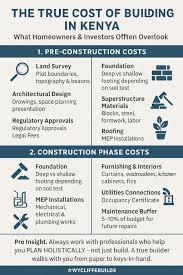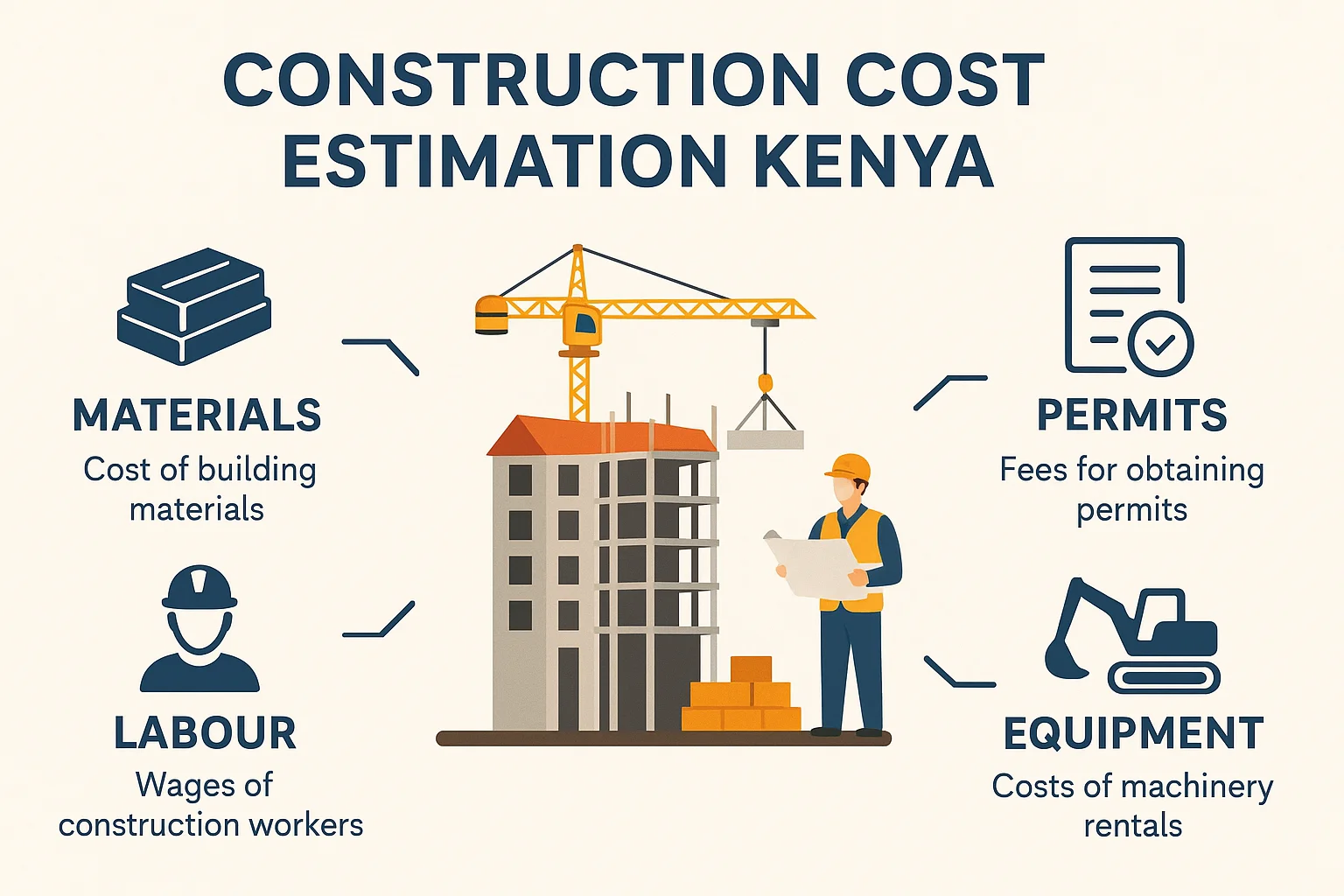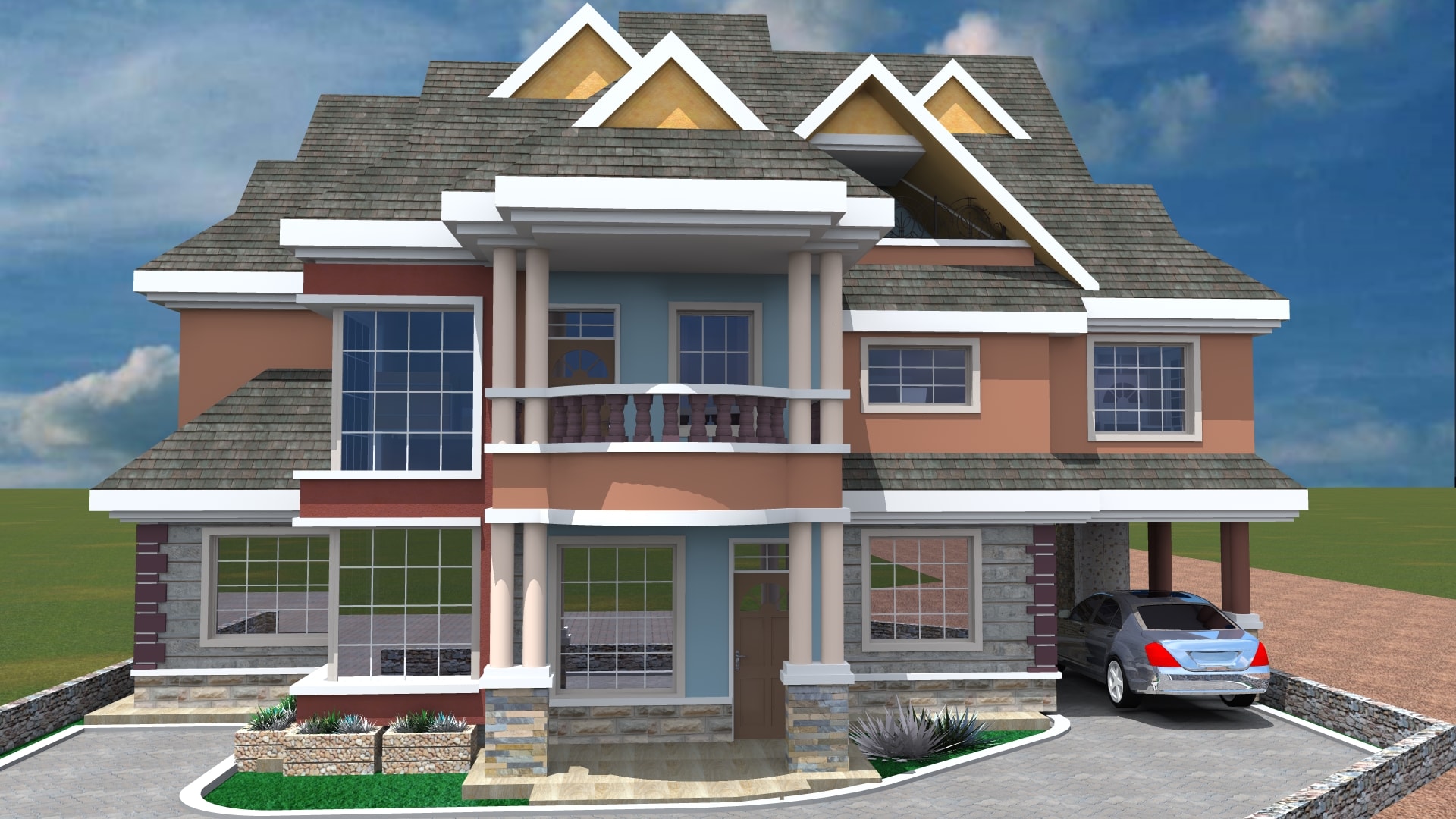Plumbing Costs in Kenya (2025 Guide)
Discover updated plumbing costs in Kenya for 2025. Learn about plumbing installation rates, materials, and pricing in Nairobi and other towns to help you budget your next construction or renovation project.
Understanding Plumbing Costs in Kenya
Plumbing is one of the most important stages of any construction project in Kenya. Whether you are building a new home, renovating, or upgrading your water system, understanding plumbing costs in Kenya helps you budget effectively and avoid surprises during installation.
Plumbing prices vary based on several factors such as labour, materials, type of project, and location. Nairobi generally records higher plumbing prices than smaller towns due to the cost of living and labour demand.
Why Knowing Plumbing Prices in Kenya Matters
Understanding plumbing prices in Kenya helps homeowners and contractors plan realistically. Without accurate cost estimates, you may underestimate expenses for materials, fixtures, and labour. Proper budgeting prevents project delays and ensures quality results.
This knowledge is particularly useful for those building modern homes where bathroom fittings, kitchen sinks, and advanced piping systems add extra costs.
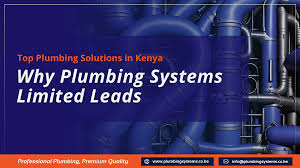
Factors Affecting Plumbing Installation Costs in Kenya
The total plumbing installation cost in Kenya depends on multiple variables. Each factor influences how much you’ll pay for both materials and professional services.
Size and Type of Building
Larger homes or commercial buildings require extensive piping, multiple water points, and complex drainage systems. This increases both labour and material costs compared to smaller residential houses. Multi-story apartments, for instance, demand extra pressure control systems and water tanks, further pushing prices up.
Type of Plumbing System
Different projects require specific plumbing systems—cold water supply, hot water systems, or full drainage installation. Hot water systems using copper or PPR pipes are more expensive than basic cold-water PVC setups. For homes with solar heating, expect additional costs for thermostatic valves and insulation.
Location and Labour Costs
Plumbing prices in Nairobi are often higher compared to towns like Kisumu or Eldoret. Plumbers in urban areas charge more due to higher living costs and transport expenses. If your property is located in a remote area, logistics costs may also increase your total plumbing budget.
Average Plumbing Costs in Kenya (2025 Estimates)
When estimating plumbing installation in Kenya, you should consider both labour and material prices. Rates may vary slightly based on your project’s scope and preferred fittings.
Residential Plumbing Costs
For an average 3-bedroom house, plumbing installation may range from KSh 120,000 to KSh 250,000, depending on the fittings and pipe quality. High-end fixtures such as Jacuzzis or rainfall showers can significantly increase total expenses.
Commercial and Apartment Plumbing Costs
Apartment or commercial projects with multiple bathrooms and kitchens typically range between KSh 400,000 and KSh 1 million or more. These installations demand higher capacity systems and certified plumbers familiar with building codes.
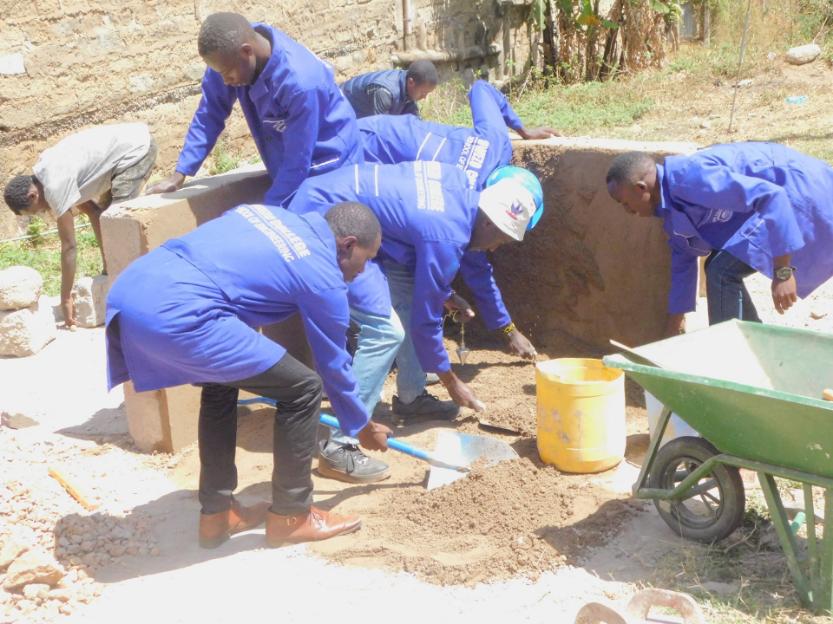
Cost of Plumbing Materials in Kenya
Common plumbing materials include PVC, PPR, and copper pipes. PVC pipes are the cheapest, costing around KSh 150–350 per meter, while PPR pipes cost KSh 250–600 per meter. Copper pipes, used for hot water, are the most expensive at KSh 800–1,500 per meter. Fittings, taps, and accessories add another KSh 30,000–70,000 depending on quality.
Cost of Plumbing Installation in Nairobi
Nairobi remains the benchmark for plumbing prices in Kenya due to its high number of ongoing projects and professional plumbers. Understanding city-specific rates helps when negotiating quotes.
Labour Charges in Nairobi
Professional plumbers in Nairobi charge between KSh 1,500 and KSh 3,000 per day for basic work. Skilled technicians handling advanced plumbing systems or multi-story projects may charge up to KSh 5,000 per day. Hiring a registered plumber ensures quality work and reduces repair risks.
Material Costs in Nairobi
Since most suppliers are based in Nairobi, you can get competitive prices on bulk plumbing materials. However, premium brands and imported fittings may cost slightly more due to taxes and demand. Always compare supplier quotes before purchasing.
How to Estimate Your Plumbing Budget
Accurate cost estimation ensures your project runs smoothly without financial strain. You can plan better by listing every material, fitting, and service before work begins.
Calculate Based on Room Count
Estimate costs by counting your water points—bathrooms, kitchens, and outdoor taps. Each adds material and labour needs. For example, a house with two bathrooms and one kitchen may require around KSh 180,000–KSh 250,000 for complete plumbing.
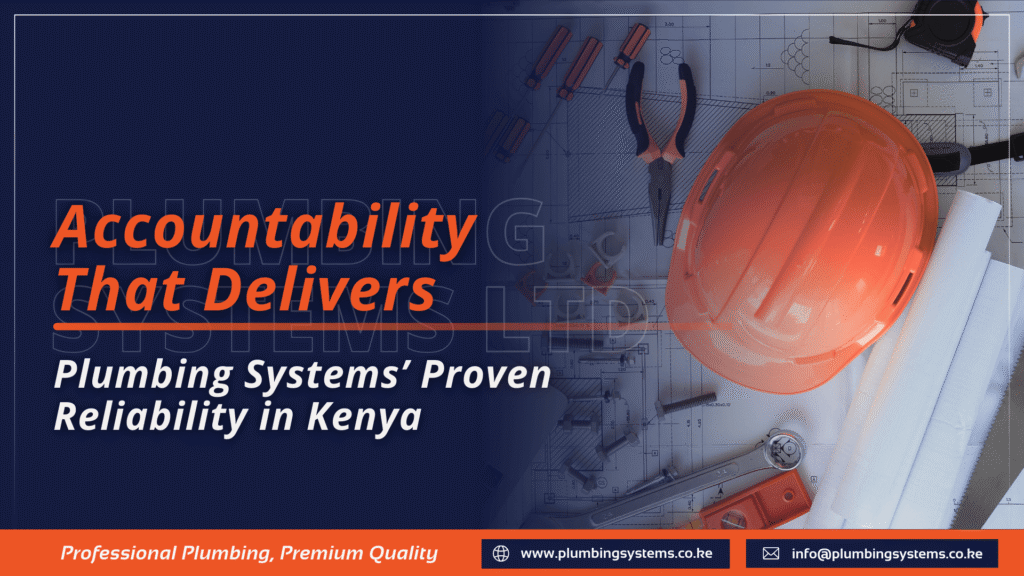
Include Hidden Costs
Plumbing projects may have hidden expenses such as wall chasing, concrete cutting, or pipe insulation. Budget at least 10–15% extra to cover these unforeseen costs. This ensures the project remains within range even with last-minute adjustments.
Choosing a Professional Plumber in Kenya
A professional plumber ensures your system is safe, leak-free, and compliant with local building codes. Avoid hiring unqualified labour to save money—it can cost more in repairs later.
Licensing and Experience
Always verify your plumber’s license and experience level. Certified plumbers are familiar with modern installation techniques and guarantee proper drainage and water pressure management. Request a portfolio or references to confirm past work quality.
Comparing Multiple Quotes
Get at least three quotes before hiring a plumber. Compare not only prices but also service quality and timelines. The cheapest option isn’t always the best; prioritise reliability and long-term performance.
Saving Money on Plumbing Installation in Kenya
You can minimise your plumbing expenses without compromising on quality by making smart decisions before and during the project.
Buy Materials in Bulk
Purchasing pipes, fittings, and valves in bulk can help you save significantly, especially for large projects. Hardware stores often offer discounts for wholesale orders, lowering your total plumbing costs.
Schedule Work Efficiently
Plan plumbing work alongside other construction stages to avoid redoing walls or floors. Coordinating with electricians and masons helps reduce delays and material wastage.
Common Plumbing Mistakes to Avoid
Mistakes during installation can lead to costly repairs. Knowing what to avoid ensures your plumbing system lasts longer and performs efficiently.
Using Poor-Quality Materials
Cheap pipes and fittings may seem like a good deal but often cause leaks or bursts. Always go for reputable brands that provide warranties and consistent pressure handling.
Ignoring Proper Slope and Drainage
Incorrect pipe slope can cause blockages and foul odors. Professional plumbers know how to set proper gradients to ensure smooth water flow, especially in bathrooms and kitchens.
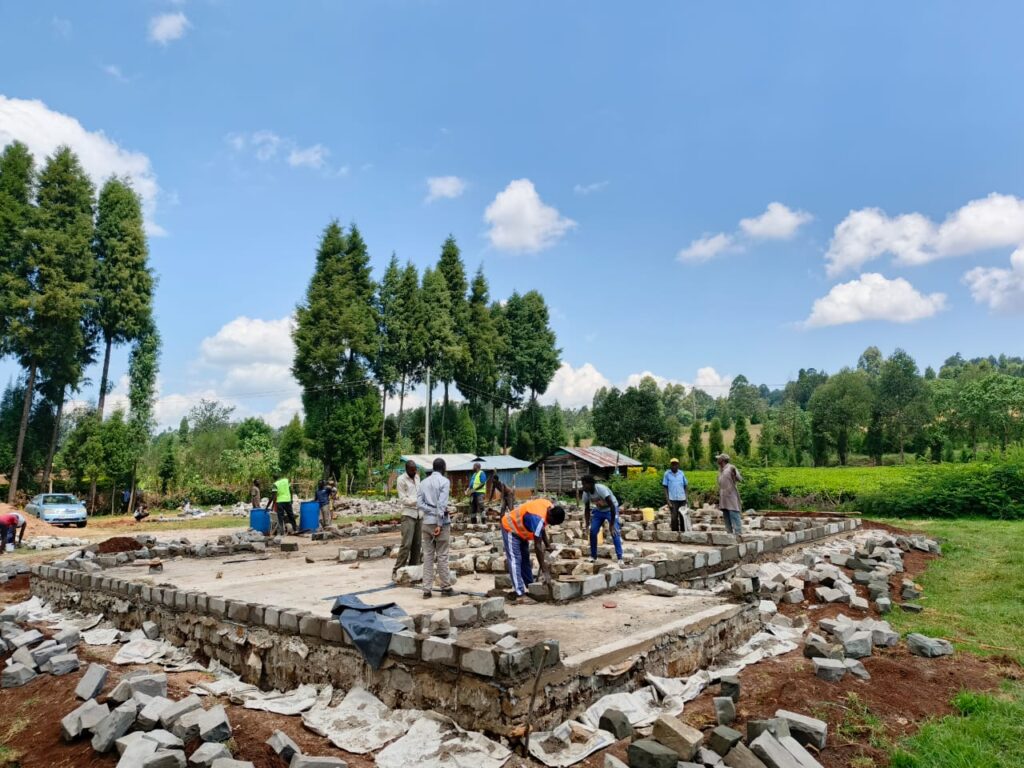
Advanced Plumbing Materials and Their Cost Impact
Modern plumbing in Kenya often requires using advanced materials to ensure durability and efficiency. High-quality piping systems such as PPR, stainless steel, and copper are preferred for long-term installations. These materials provide resistance to corrosion, pressure fluctuations, and temperature variations, which are common issues in urban and coastal areas. Choosing superior materials can significantly increase initial plumbing costs, but the investment reduces long-term maintenance and replacement expenses. It is also important to consider compatibility with existing systems to avoid extra modification costs during installation. Professionals recommend prioritising materials based on water quality and household usage patterns, which can influence pipe longevity. By carefully selecting materials, homeowners can strike a balance between upfront cost and long-term value. Using substandard pipes might save money initially but often leads to leaks, blockages, and costly repairs down the line.
PPR vs PVC Pipes for Residential Use
PPR pipes have grown popular in Kenya due to their high resistance to heat and pressure. Unlike PVC pipes, PPR offers a longer lifespan and better joint stability, reducing the risk of leaks over time. They are ideal for hot water systems and multi-story buildings where water pressure varies significantly. Installation requires professional expertise, as improper joining can compromise the system’s integrity. While PPR pipes cost more than standard PVC, they minimise future maintenance costs, making them a more economical choice over the years. PVC pipes, on the other hand, remain suitable for cold water systems and smaller projects with budget constraints. Choosing between these options requires evaluating long-term needs versus upfront affordability. In coastal regions, corrosion resistance is another critical factor favoring PPR pipes over traditional alternatives.
Stainless Steel Pipes for Modern Installations
Stainless steel piping is increasingly used in luxury residential and commercial projects in Nairobi. They resist rust, scale build-up, and chemical reactions from hard water, which extends the lifespan of the plumbing system. While the installation cost is higher than conventional materials, they require minimal maintenance and provide excellent durability. Stainless steel fittings also offer aesthetic appeal, especially in exposed piping systems in modern homes. This material is ideal for areas with high water hardness and variable pressure, ensuring a consistent and safe water supply. Using stainless steel can significantly reduce long-term plumbing replacement costs. However, only skilled plumbers with proper welding and joining techniques should handle installation. Considering all these factors, stainless steel is an investment in quality and reliability rather than just an immediate cost.
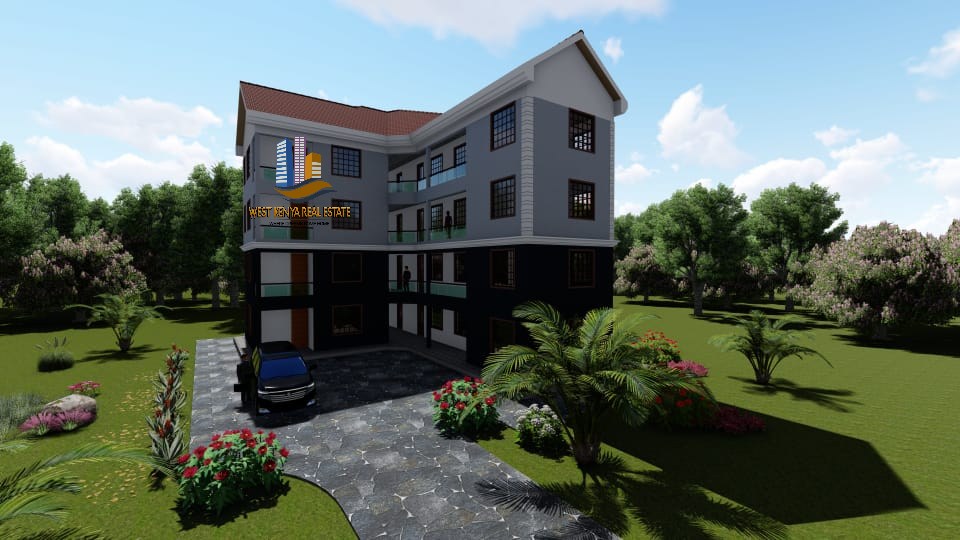
Plumbing Maintenance Strategies to Reduce Costs
Regular plumbing maintenance in Kenya can prevent costly repairs and extend system longevity. Homeowners often underestimate how routine inspections and preventive measures affect overall plumbing expenses. Regular checking of taps, pipes, and joints can identify leaks early before they escalate into significant damage. Flushing water heaters, cleaning drainage systems, and inspecting tank valves are essential steps to maintain efficiency. Preventive maintenance also helps in detecting water pressure issues, corrosion, and joint weaknesses, which are common causes of major failures. Many plumbers in Kenya offer annual service packages that reduce emergency call-out costs. By implementing structured maintenance strategies, households can avoid unexpected expenses and ensure uninterrupted water supply. Additionally, proper maintenance increases the value of a property when selling, as buyers often consider the state of plumbing as a quality indicator.
Seasonal Plumbing Checks
Kenya’s rainy season increases the risk of sewer blockages and water contamination, which can damage plumbing systems. Seasonal inspections ensure that drainage channels, gutters, and septic connections remain functional. Cleaning filters and checking for leaks before heavy rainfall can prevent water damage and costly repairs. Seasonal checks also help maintain water pressure consistency throughout the home. Professionals recommend reviewing plumbing fixtures quarterly and adjusting components prone to wear. Ensuring that outdoor taps and pipes are protected from sudden weather changes can prolong lifespan. Documentation of seasonal maintenance helps track recurring issues and plan future upgrades. Ignoring seasonal maintenance can result in emergency repair costs that are significantly higher than routine checks.
DIY Maintenance vs Professional Services
Basic maintenance like unclogging sinks or replacing faucet washers can be done by homeowners. However, complex issues such as pipe leaks, water heater servicing, or multi-story installations require professional expertise. Attempting DIY for advanced plumbing can worsen damage and increase future costs. Licensed plumbers bring technical knowledge, proper tools, and warranties for their work, providing peace of mind. While hiring a professional may seem expensive initially, it reduces long-term expenses by preventing recurring problems. Homeowners should identify maintenance tasks suitable for DIY to balance cost and safety. Combining DIY and professional services strategically offers the best cost-saving approach. Consistent documentation of all maintenance work ensures accountability and future reference.
Smart Plumbing Systems and Technology Integration
Modern homes in Kenya increasingly adopt smart plumbing technologies to optimize water usage. Automated valves, pressure sensors, and leak detection systems improve efficiency and reduce wastage. These systems require higher initial investment but offer long-term savings by preventing water loss and minimising emergency repairs. Smart water meters allow homeowners to monitor consumption and detect anomalies in real-time. Integration with solar heating systems or rainwater harvesting improves sustainability and reduces utility costs. Advanced plumbing technology also increases property appeal and resale value. Skilled plumbers with technology experience are necessary for proper installation and calibration. Investing in smart plumbing ensures modern, efficient, and eco-friendly water management in homes.
Leak Detection and Prevention Systems
Automatic leak detection devices alert homeowners of water leaks before they cause significant damage. These systems can shut off water supply instantly, preventing flooding and property damage. Integration with mobile apps allows remote monitoring and control of plumbing systems. Installation requires professional expertise to connect sensors and valves accurately. The cost of installation is justified by the potential savings on repair bills and water wastage. Smart leak detection also reduces insurance claims related to water damage. In high-rise buildings, these systems are particularly beneficial due to complex piping networks. Regular testing of the system ensures that it functions properly and continues to protect the property.

Water-Saving Fixtures and Appliances
Water-efficient faucets, toilets, and showers reduce monthly water bills and preserve resources. Dual-flush toilets and low-flow showerheads are examples commonly adopted in Nairobi homes. While initially more expensive than traditional fixtures, these appliances save money over time by lowering consumption. Coupled with smart meters, homeowners can track usage patterns and make informed adjustments. Rainwater harvesting systems integrated with plumbing further enhance water conservation. Proper maintenance ensures longevity and consistent efficiency of these appliances. Choosing certified products guarantees compliance with safety and performance standards. Over time, these investments provide both financial and environmental benefits.
Cost-Benefit Analysis: DIY vs Hiring Professionals
When planning plumbing projects, homeowners often weigh DIY efforts against professional services. While DIY may save labor costs initially, advanced projects require expertise to avoid future problems. Professionals offer guarantees, proper installation, and compliance with building regulations. Incorrect installations can lead to leaks, water damage, or pressure issues that become costly over time. Skilled plumbers ensure that piping materials, fixtures, and systems are installed correctly the first time. The cost-benefit analysis shows that investing in qualified professionals reduces long-term maintenance and emergency repair expenses. Strategic DIY, like minor faucet replacements, can complement professional services to optimise cost savings.
Long-Term Savings with Professionals
Hiring certified plumbers can prevent repeated failures that occur with DIY fixes. Professionals bring knowledge, experience, and tools to ensure plumbing systems last longer. Long-term savings often outweigh the initial investment by reducing emergency call-outs. Quality installation also maintains property value and ensures system efficiency. Professional advice can help select materials that balance durability with affordability. By documenting all work, homeowners can track costs and future maintenance needs. Professionals also guarantee compliance with Kenya’s plumbing regulations, avoiding fines and legal issues. Over time, this approach provides better financial predictability and system reliability.
When DIY Makes Sense
Certain tasks such as cleaning blocked drains, tightening fixtures, or changing washers are safe for homeowners. DIY projects reduce small costs and allow learning basic plumbing maintenance. However, it’s essential to recognise limits to prevent escalating problems. Minor DIY interventions are most effective when combined with professional checks for complex systems. Homeowners should always consult guidelines or tutorials before attempting advanced fixes. Using the correct tools and following safety measures ensures successful outcomes. Balancing DIY with professional services offers the best mix of savings and reliability. Regularly evaluating when to hire professionals vs DIY ensures optimal cost management.
Emergency Plumbing Preparedness and Budgeting
Unexpected plumbing emergencies can disrupt daily life and inflate expenses. Planning for emergencies helps homeowners avoid panic spending and reduces property damage. Preparing a budget for urgent repairs ensures access to necessary materials and labour quickly. Keeping emergency contact lists of licensed plumbers reduces response time during crises. Understanding common emergencies like burst pipes, blocked drains, or water heater failures allows proactive solutions. Homeowners can maintain basic repair tools and replacement parts for minor issues. Regular inspections minimise the frequency of emergencies and protect the property effectively.
Common Plumbing Emergencies in Kenya
Burst pipes, clogged drains, and leaking tanks are the most frequent emergencies. High water pressure, old piping, and seasonal rains contribute to these problems. Prompt response is crucial to prevent water damage and structural issues. Professional plumbers handle emergencies efficiently, reducing repair time and costs. Installing shut-off valves and pressure regulators adds an extra layer of protection. Documenting previous incidents can guide preventative measures for future events. Planning for emergencies also ensures that budgets account for unforeseen plumbing work, avoiding financial strain. Awareness of potential issues ensures homeowners act proactively rather than reactively.
Budgeting for Emergency Repairs
Setting aside 10–15% of the plumbing budget for emergencies is recommended. This reserve covers urgent labor, materials, and call-out fees. Preparing this budget ensures quick action without compromising regular maintenance plans. Homeowners can prioritise high-risk areas like bathrooms, kitchens, and water tanks. Emergency budgeting also allows for purchasing quality materials promptly rather than settling for cheaper, substandard alternatives. It helps avoid long-term damage due to delays in repairs. Strategic budgeting contributes to overall financial stability while ensuring plumbing reliability. Maintaining an emergency fund is a simple yet effective method for proactive plumbing management.
Conclusion
Plumbing costs in Kenya vary depending on location, materials, labour, and project complexity. By understanding these factors and hiring qualified professionals, you can avoid hidden expenses and ensure long-lasting installations. Nairobi’s plumbing prices are slightly higher, but the competition among skilled plumbers ensures you can still find value for money.
Whether building a new home or renovating, always plan your plumbing budget early to achieve both functionality and savings.
